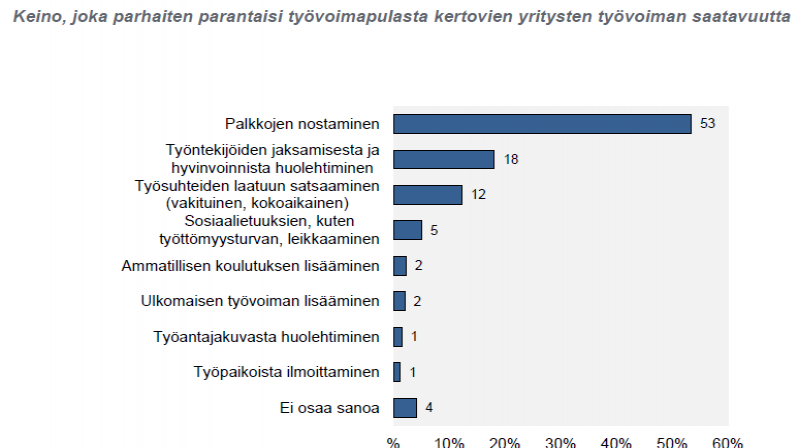No improvement in attraction of service sectors
Over half the population would attract employees with pay rises, according to survey.
Only five per cent of Finns see cuts to social security as a solution to companies’ labour shortages. Pay rises, on the other hand, are seen as a way to attract employees. This is the finding of a survey carried out by Kantar TNS. The study was commissioned by Service Union United.
For over 10 years, PAM has carried out a survey of the attractiveness of its major membership sectors – commerce, hospitality and property services. This time PAM also asked people in Finland what they think are the best ways to attract labour to sectors suffering from labour shortages.
The survey was carried out in Gallup Forum in November 2021. 1106 individuals were interviewed for the study. The study’s statistical error margin is +/-2.9 percentage points.
Over half of working-age Finns (53%) think pay rises are the best way to improve the labour supply. Around one in five (18%) believe that focusing on coping and wellbeing will attract labour. Around one in 10 (12%) would rely on investing in the quality of employment relationships.
Very few respondents - only one in 20 (5%) – would resort to widely discussed cuts to social security, for example unemployment security. The self-employed are the most inclined to favour cuts to social security. Even fewer thought education and foreign labour were the answer.
“The Finns don’t seem to think applying a stick would help to solve labour shortages. Of course you could ask if an approach based on compulsion like this adding to the recruitment problem”, PAM President Annika Rönni-Sällinen wonders.
The survey asks working-age Finns for their impression of sectors and the attractiveness and reputation of these as employers. They are also asked how keen they would be to see family and friends in the sector. 80 per cent of respondents appreciate employees in the sectors.
Among various perceptions, the amount of part-time work and interaction is most often associated with the commerce and hospitality sectors. In property services, on the other hand, the work is seen as clearly defined and finding a job easy.
Another factor that the three sectors have in common is that they are not associated with attractive wages. It is not thought that employees in commerce can influence the content of the work, in the hospitality sector the working hours don’t suit parents of small children and property services work is not considered sought-after.
The commerce sector is the most popular, well known and attractive of the three. The property services sector and the hospitality sector are fairly equal. The property services sector is seen slightly more favourably and the hospitality sector less favourably.
“Changes can happen in the space of 10 years, but they have been very small across the board”, says PAM’s research director Antti Veirto.
Rönni-Sällinen says the survey and the views of working-age Finns on how to tackle labour shortages confirm PAM’s ideas on how to increase the sectors’ appeal.
“The focus is then on pay and the number of working hours, and on various things to improve workers’ coping and wellbeing”, Rönni-Sällinen says.



